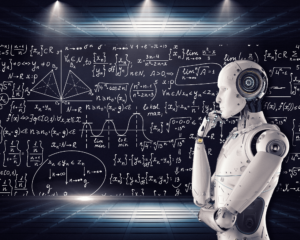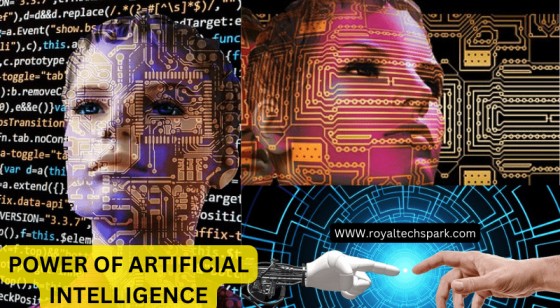
- Introduction:
- What is artificial intelligence?
- Understanding AI:
- Applications of AI:
- Impact of AI:
- Future Prospects of AI:
- Advantages of AI:
- Key Areas of AI
- FAQ’s:
- Q1: How does AI learn?
- Q2: Can AI replace human jobs?
- Q3: What are the ethical implications of AI?
- Q4:Who is the father of AI?
- Q5: How can AI be used in real life?
- Q6:Is artificial intelligence (AI) beneficial or bad?
- Q7: What are disadvantages of AI?
- Q8: Which AI is free?
- Q9:How can I become an AI student?
- Q10:What next after AI?
- Conclusion:
Introduction:
In the fast-paced world of technology today, artificial intelligence (AI) is making a significant impact, transforming different sectors and influencing our daily lives and work routines. AI is not only improving productivity but also creating tailored interactions, opening up a wide array of opportunities. Let’s take a closer look at the realm of artificial intelligence and uncover its potential for transformation.
What is artificial intelligence?
Artificial intelligence involves creating computer systems that can think and learn similarly to humans. It encompasses various technologies like machine learning, natural language processing, robotics, and computer vision. These tools enable robots to perform tasks that typically require human intelligence, such as understanding language, recognizing patterns, problem-solving, and decision-making.

Understanding AI:
Applications of AI:
Impact of AI:
Future Prospects of AI:
Ethical Concerns: With the ongoing progress of AI, it is crucial to address ethical issues related to data privacy, algorithm bias, and job displacement. Human-Machine Collaboration: The key to the future of AI lies in fostering collaborative partnerships between humans and machines, harnessing the unique strengths of each for the best possible results. Ongoing Progress: AI research is continuously evolving, with breakthroughs in deep learning, reinforcement learning, and neural networks shaping the trajectory of this technology.
Advantages of AI:
Enhanced Productivity Artificial intelligence (AI) systems have the capability to process and analyze large amounts of data at a faster pace than humans, leading to increased productivity and efficiency across various industries. Cost Savings Implementing automation to replace manual labor in repetitive tasks can result in significant cost savings for businesses. Enhanced Decision-Making AI algorithms provide valuable forecasts and insights that aid in decision-making processes, particularly in sectors such as marketing, banking, and healthcare. Originality AI drives innovation by enabling the development of new products, services, and business strategies. By handling complex tasks, it fosters creativity and problem-solving abilities.
Key Areas of AI
Machine learning (ML).
Machine Learning is a subset of AI in which computers are trained to learn from data and generate predictions or judgments. ML models improve with time as they are exposed to more data. Examples include recommendation systems, fraud detection, and predictive analytics.
Natural language processing (NLP).
NLP helps robots comprehend, interpret, and respond to human language. Chatbots, language translation services, and sentiment analysis are some of the applications of natural language processing.
Robotics
Robotics is the design and development of robots capable of performing autonomous or semi-autonomous activities. Robots are frequently utilized in the industrial, healthcare, and logistics industries to improve efficiency and precision.
FAQ’s:

Q1: How does AI learn?
A1: AI learns through algorithms that analyze data, identify patterns, and adjust their parameters based on feedback to improve performance over time.
Q2: Can AI replace human jobs?
A2: While AI may automate certain tasks, it also creates new job opportunities in fields like data science, AI ethics, and human-machine collaboration.
Q3: What are the ethical implications of AI?
A3: Ethical considerations in AI include issues of bias in algorithms, data privacy, transparency, and the impact of AI on society and employment.
Q4:Who is the father of AI?
A4: John McCarthy is known as the father of artificial intelligence. John McCarthy was an American computer scientist. He invented the phrase “artificial intelligence”.
Q5: How can AI be used in real life?
A5 :AI makes it easier than ever for users to create and alter graphic components for both personal and professional projects.
Learn how to create custom art, professional product photos, logos, illustrations, videos, headshots, and expert photo editing.
Q6:Is artificial intelligence (AI) beneficial or bad?
A6: AI is neither necessarily good or harmful. It is a tool that may be used for both good and bad reasons, depending on how it is created and employed. technology is critical to approach AI with caution and responsibility, making certain that technology is created and deployed in an ethical and transparent manner.
Q7: What are disadvantages of AI?
A7:
- Unemployment.
- Make Humans Lazy.
- No Ethics.
- Emotionless..
- No Improvement
- No Creativity. A big disadvantage of AI is that it cannot learn to think outside the box.
- High costs. Developing a machine capable of simulating human intellect is a significant achievement.
Q8: Which AI is free?
My edit – Creating, editing, and enhancing audio and pictures
PhotoDirector – AI photo editing
PowerDirector – AI video editing
AudioDirector – AI audio restoration and editing
Q9:How can I become an AI student?
Start with a thorough grasp of a programming language, preferably Python, and a background in computer science. Learn the fundamentals of algorithms next, then machine learning and data science concepts. Utilize theoretical understanding in AI initiatives. Beginner-friendly websites like as GitHub and Kaggle provide a wide variety of projects.
Q10:What next after AI?
In order to improve computing beyond the classical paradigm, this multidisciplinary area augments arithmetic, physics, and computer science with quantum mechanics. Marketsandmarkets projects that the quantum computing industry will grow to a value of $5.3 billion by 2030.
Conclusion:
It stands at the forefront of technological innovation, reshaping industries, enhancing efficiency, and driving progress in diverse domains. As we navigate the evolving landscape of AI, it is crucial to embrace its potential while addressing ethical concerns and fostering collaboration between humans and machines for a sustainable future.
Read more about Quantum Computing
